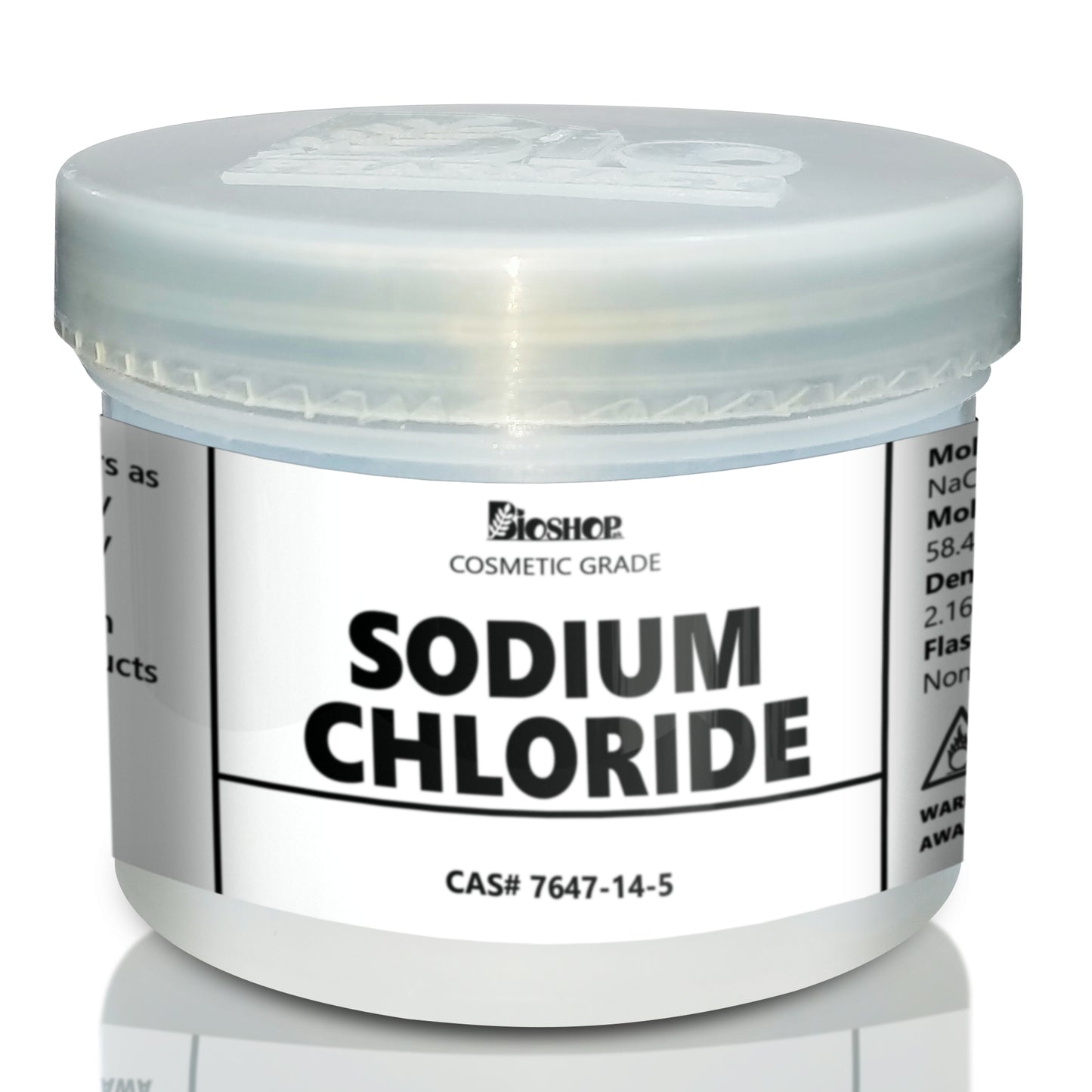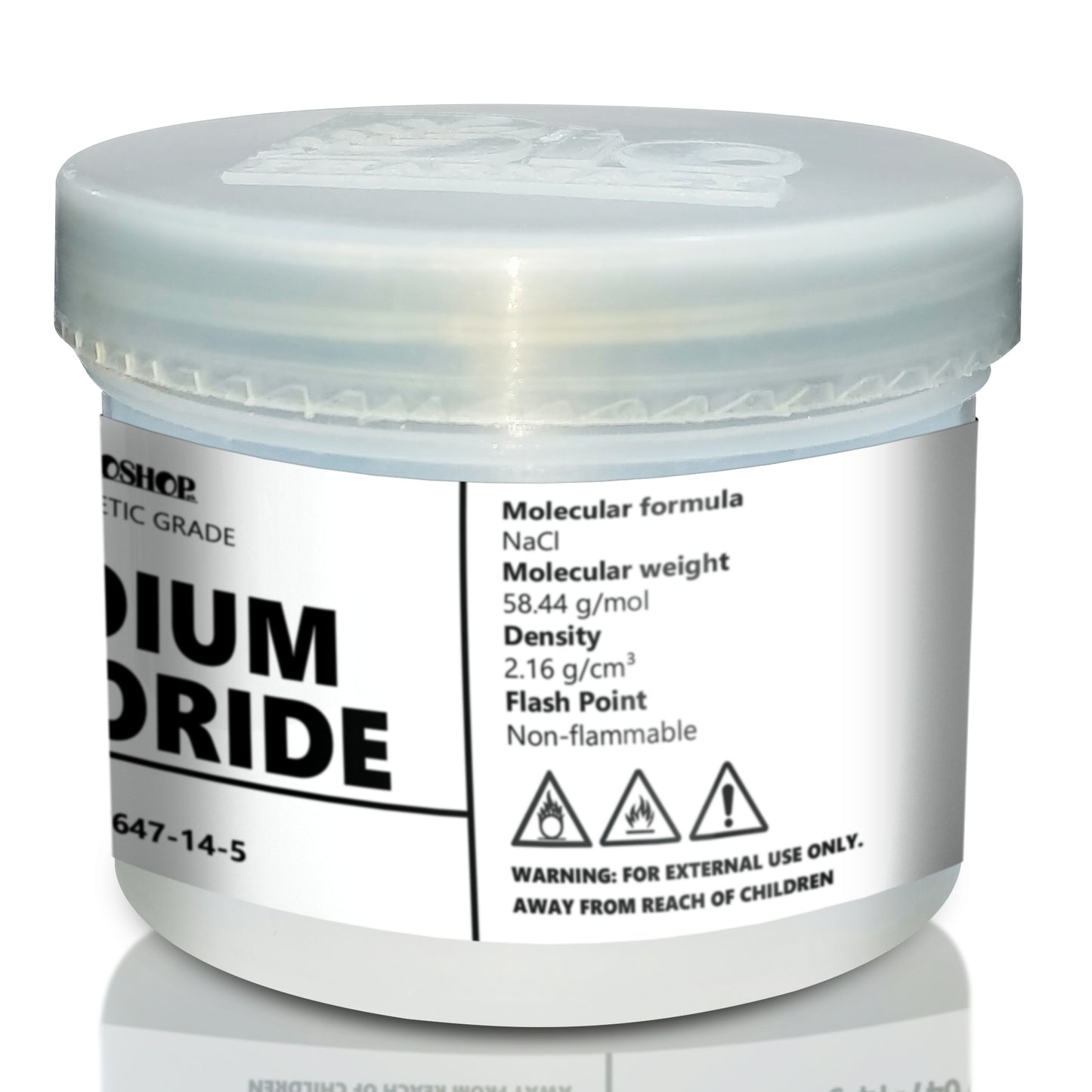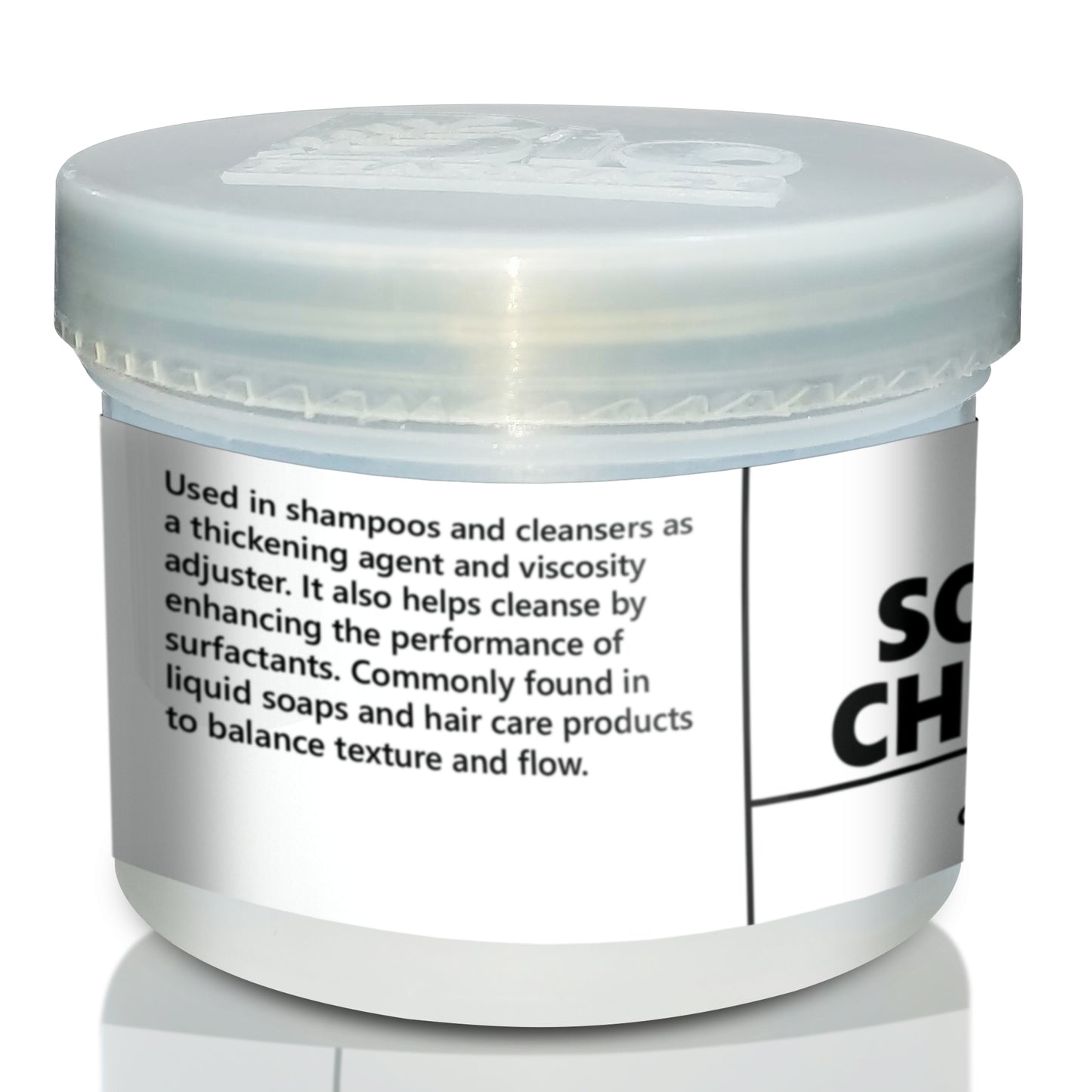Bio Shop
Sodium Chloride
Sodium Chloride
Key Functions: Works as a viscosity modifier, exfoliant, and mineral-rich additive in cosmetic and personal care products.
Couldn't load pickup availability



Explore
Information About Sodium Chloride
✅ Key Features
- Natural mineral salt (NaCl) with high cosmetic purity
- Thickens anionic surfactant systems like shampoos and washes
- Used as a gentle exfoliant in scrubs and salt-based treatments
- Enhances cleansing and purifying properties
- Improves bath salt hardness and skin-softening effects
🔬 Description
Sodium Chloride, also known as cosmetic-grade salt, is a versatile raw material used for its thickening, cleansing, and exfoliating properties. It’s commonly added to shampoos and body washes to increase viscosity and reduce runniness. As a granular exfoliant, it gently removes dead skin cells and purifies the skin. It also serves as the base for bath salts, scrubs, and DIY mineral treatments. Pure, food-grade salt may also help draw out toxins and minerals during soaking rituals.
📊 Technical Data
INCI Name: Sodium Chloride
CAS Number: 7647-14-5
Solubility: Soluble in water
Add Phase: Cool-down or water phase depending on use
pH Stability: Stable across full cosmetic pH range
Processing Temperature: Not heat-sensitive
Appearance: White crystalline granules or powder
Odor: Odorless
Molecular Formula: NaCl
Molecular Weight: 58.44 g/mol
Flash Point: Non-flammable
Density: ~2.17 g/cm³
Chemical Type: Inorganic salt
Functional Groups: Ionic compound (Na⁺ and Cl⁻)
Primary Cosmetic Uses: Thickening, exfoliation, bath soaks, cleansing booster
🧪 Recommended Usage
- Usage Rate: 1% – 5% for thickening; up to 60% for scrubs/baths
- Phase: Water phase or cool-down depending on purpose
- Ideal For: Shampoos, Body Washes, Scrubs, Bath Soaks, Mineral Cleansers
💡 Pro Tip
🧂 To thicken shampoo, dilute NaCl in water first, then add gradually with stirring. Too much salt can thin the formula — test in increments (0.5%–1% max).
👩🔬 Skin Type Compatibility
✔️ Suitable for normal, oily, and combination skin
⚠️ Avoid overuse on dry or irritated skin due to mild drying effect
🧴 Formulation Ideas
1. Thickening Shampoo Base
Add small increments of Sodium Chloride (0.5%–2%) to increase viscosity in anionic surfactant-based shampoos.
2. Exfoliating Salt Scrub
Use 60% fine-grain NaCl with coconut oil, shea butter, and fragrance oil for an invigorating body polish.
3. Detox Bath Salt
Combine with magnesium sulfate and essential oils like eucalyptus or lavender for a rejuvenating soak.
4. Mineral Foot Soak
Add 30% sodium chloride with peppermint and tea tree oil for refreshing foot care.
5. Cleansing Bar Additive
Enhance soap hardness and purifying power by adding up to 2% in melt-and-pour soap formulations.
💧 Cosmetic Suitability:
Serums
☆☆☆☆☆ – Not Suitable
🟥⬜⬜⬜⬜
Creams & Lotions
⭐⭐☆☆☆ – Fair
🟧🟧⬜⬜⬜ – Minimal use, often as trace mineral.
Toners
⭐⭐☆☆☆ – Fair
🟧🟧⬜⬜⬜ – Used in mineral facial mists at low %
Face Masks
⭐⭐⭐☆☆ – Moderate
🟧🟧🟧⬜⬜ – Adds mineral detoxifying properties in wash-off masks.
Cleansers
⭐⭐⭐⭐☆ – Good
🟩🟩🟩🟩⬜ – Used in facial and body scrubs or exfoliating cleansers.
Hair Masks
⭐⭐☆☆☆ – Fair
🟧🟧⬜⬜⬜ – Occasionally used for scalp detox blends.
Deodorants
⭐⭐⭐☆☆ – Moderate
🟧🟧🟧⬜⬜ – May be added to salt-based deodorants.
Shampoos
⭐⭐⭐⭐⭐ – Excellent
🟩🟩🟩🟩🟩 – Thickens and boosts cleansing in surfactant formulas.
Soaps
⭐⭐⭐⭐☆ – Good
🟩🟩🟩🟩⬜ – Enhances soap hardness and exfoliation.
Conditioners
⭐☆☆☆☆ – Poor
🟥⬜⬜⬜⬜ – Not compatible with conditioning systems.
Lip Balms
☆☆☆☆☆ – Not Suitable
🟥⬜⬜⬜⬜
Body Butters
⭐☆☆☆☆ – Poor
🟥⬜⬜⬜⬜ – Rarely used; can irritate sensitive skin.
❓ FAQs
Q1: Is this table salt?
A1: No, this is cosmetic-grade Sodium Chloride, more refined than table salt and free from additives like iodine or anti-caking agents.
Q2: Can I use it in bath bombs?
A2: Yes, but it's typically added to bath soaks or salts, not bath bombs which rely on bicarbonates.
Q3: Can this irritate sensitive skin?
A3: In high concentrations or scrubs, it may cause dryness. Always patch test or combine with oils.
Q4: Will it work in sulfate-free shampoos?
A4: It may not thicken sulfate-free systems well. Works best with SLES, SLS, or ALS.
Q5: Is it natural?
A5: Yes, Sodium Chloride is a naturally occurring mineral salt and widely accepted in natural formulations.
📂 Documentation
Upon request, we will provide.
Where Can You Safely Use Sodium Chloride
Discover how Sodium Chloride performs across different products — rated for safety, stability, and effectiveness.




